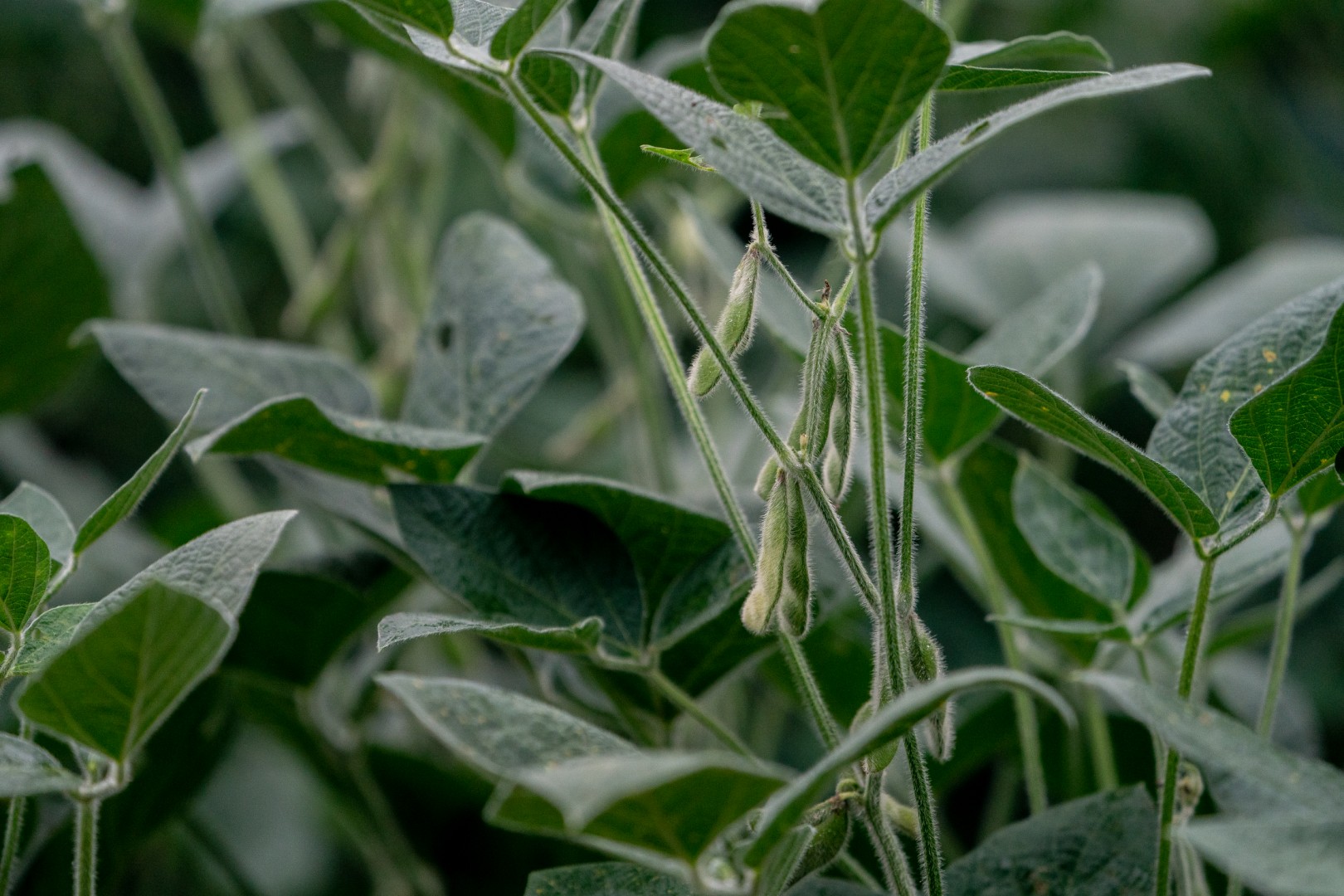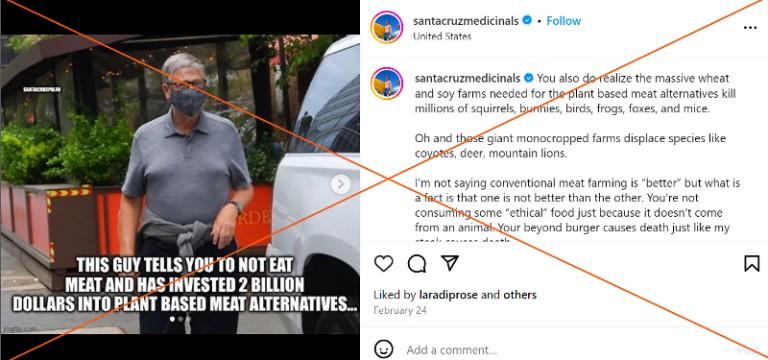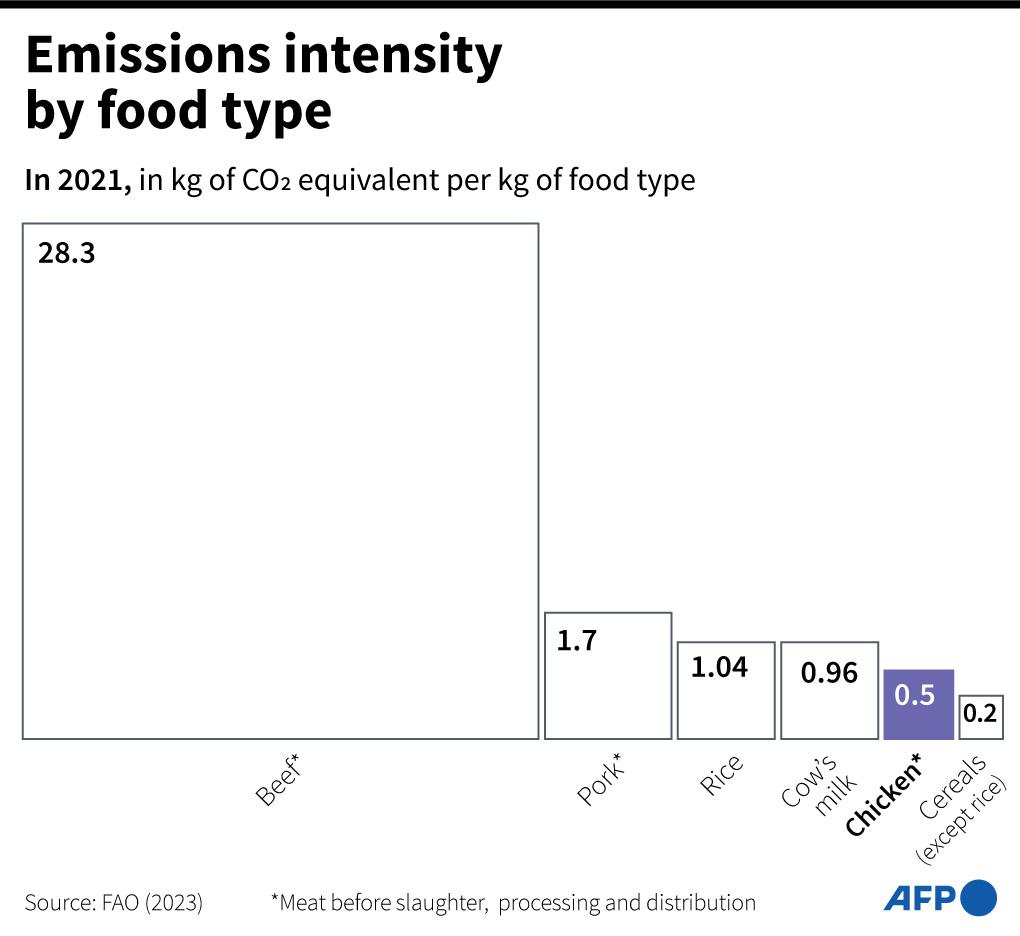
Influencer misrepresents environmental impact of cereal crops versus livestock
- This article is more than one year old.
- Published on March 15, 2024 at 20:52
- 4 min read
- By Manon JACOB, AFP USA
"Your beyond burger causes death just like my steak causes death," says Brendan Ruh in a February 24, 2024 Instagram post.
Ruh, posting as @santacruzmedicinals, goes on to say the "massive wheat and soy farms needed for the plant based meat alternatives kill millions of squirrels, bunnies, birds, frogs, foxes, and mice."

On his website he promotes a variety of CBD products and encourages people to follow the paleo diet, a controversial meat-focused nutrition plan that gained popularity in the United States in the early 2010s.
The influencer's comparison of the carbon footprint of plant-based products to that of cattle raised for human consumption is misleading, experts told AFP.
"Meat fed on soy or corn is inefficient in comparison to directly eating protein crops," said Delphine Deryng, a guest researcher at Humboldt University of Berlin and lead author of an Intergovernmental Panel on Climate Change chapter on food products (archived here).
AFP has previously investigated claims about cattle's effect on greenhouse gas emissions. Research shows most methane produced by humans is the result of enteric fermentation from livestock (archived here and here).
Land and water use
Meat production, particularly beef, requires far more water than plants.
"Vast monocultures of corn or soybean are not particularly great for biodiversity, but if their harvest is used to produce meat alternatives rather than feeding livestock, the overall environmental footprint is substantially smaller," said Jonas Jägermeyr, a climate change scientist and crop modeler at Columbia University (archived here), on March 5.
"Feeding crops to livestock instead of eating it directly requires much more land and water to produce the same amount of food."
Hanna Tuomisto, professor of sustainable food systems at the Helsinki Institute of Sustainability Science (archived here), agreed.
About "80 percent of agricultural land is used for livestock production globally, whereas livestock products provide less than 18 percent food energy and less than 40 percent of protein," she said March 14. A 2018 research paper published similar data (archived here).
David Tilman, an ecologist at the University of Minnesota (archived here), told AFP on March 6 that "the assertion that massive soy and wheat farms are required to make foods that are alternatives to beef, pork and chicken is incorrect in multiple ways."
Tilman pointed to the fact that one kilogram of edible animal protein requires three to 10 kilograms of plant protein depending on the livestock (archived here), in addition to more land use.
Emissions
A growing demand (archived here) for animal-based food products -- mostly tied to global population growth and an improvement in worldwide standards of living -- therefore raises concerns about continued high emission trends from agriculture if dietary changes do not occur.
The US Environmental Protection Agency reports that while overall methane emissions fell nationally between 1990 and 2021, those from agricultural sources -- specifically enteric fermentation from cattle -- increased during in the same period (archived here and here).

Studies have projected a significant decrease in global emissions if consumers adopt plant-based diets within the next few decades (archived here and here).
In the United States alone -- where meat consumption is more than three times the global average per capita -- a change in dietary habits could have a far greater effect on emissions than elsewhere, according to a 2018 case study (archived here).

Scientists say cutting emissions is essential to limit the rise of average global temperatures and the worst effects of climate change (archived here).
"Eating less meat helps preserve the biodiversity of the tropics and allows pastures, grazing lands and some croplands to be restored into natural ecosystems that support wild animals," Tilman said.
Monocrops and biodiversity
Andres Agudelo-Suárez, a lecturer at Universidad de la Costa in Colombia and a researcher of sustainable food systems (archived here), told AFP large-scale monoculture production primarily affects biodiversity (archived here).
"All activities that are based on industrial and large-scale exploitation produce various ecological and social trade-offs," he said March 8. "It does not matter whether it is cattle or flowers, wheat or soybeans."
Ecologist Camille Parmesan (archived here) agreed.
"There is a real conflict between producing food and protecting biodiversity, regardless of what kind of food is being farmed -- animals and plants are both harmful to biodiversity," she said March 10.
But Parmesan, who researches the effects of global climate change on biodiversity, told AFP the harm caused by agriculture "can be much reduced by changing how we produce food," noting that Ruh's Instagram post ignores the complexity of food systems.
"There is a vast array of approaches that, if implemented at a global scale, would go a long way towards maximizing food production while minimizing biodiversity loss," she said, pointing to better crop management and consuming more local products.
"Some land is better for animal production than for plant production, and vice-versa."
AFP has debunked other claims about the effects of humans on global warming here.
Copyright © AFP 2017-2026. Any commercial use of this content requires a subscription. Click here to find out more.
Is there content that you would like AFP to fact-check? Get in touch.
Contact us




